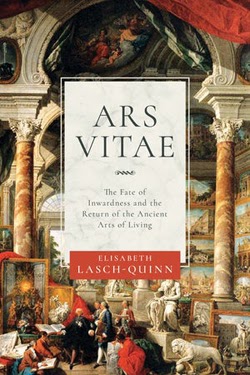Ars Vitae: The Fate of Inwardness and the Return of the Ancient Arts of Living
Elisabeth Lasch-Quinn
University of Notre Dame Press, December 2020

In her new book, “Ars Vitae: The Fate of Inwardness and the Return of the Ancient Arts of Living” (Notre Dame Press), Elisabeth Lasch-Quinn, professor of history in the Maxwell School, explores Americans’ stirring interest in ancient Greco-Roman philosophies including Cynicism, Platonism, Gnosticism, Stoicism and Epicureanism, and whether they can offer any alternatives to contemporary consumer culture as a means to happiness and well-being.
“Ars Vitae,”Latin for “the Art of Life,” is an ambitious historical project connecting ancient philosophy to our modern way of life. Using a variety of films, manuals, popular culture, and scholarly works, Lasch-Quinn traces the ancient philosophical ways of living, juxtaposing them to America’s age of self-focused consumerism. She asks whether ancient philosophies in their new forms contradict or harden our approach to inwardness in society today. “Ars Vitae”digs deep into the roots of the meaning of life and challenges our normative ways of being.
Lasch-Quinn is a senior research associate in the Campbell Public Affairs Institute at the Maxwell School. She is also a non-residential visiting faculty fellow of the Institute for Advanced Studies in Culture’s Foundation, In Media Res, at the University of Virginia. Her current research interests focus on how individuals and societies over time address the question of how to live, particularly as it relates to self-worth, well-being and happiness. Lasch-Quinn’s other research interests include historical race relations in America, the arts, Platonism and Neoplatonism, Ancient Greco-Roman philosophy, and European and American intellectual history. In 2017, the Department of History at Syracuse University awarded Lasch-Quinn with the Frank and Helen Pellicone Faculty Scholar Award.
October 16, 2020 | Chad Chambers, PhD candidate in geography
Publisher's Summary:
The ancient Roman philosopher Cicero wrote that philosophy is ars vitae, the art of living. Today, signs of stress and duress point to a full-fledged crisis for individuals and communities while current modes of making sense of our lives prove inadequate. Yet, in this time of alienation and spiritual longing, we can glimpse signs of a renewed interest in ancient approaches to the art of living.
In this ambitious and timely book, Elisabeth Lasch-Quinn, professor of history, engages both general readers and scholars on the topic of well-being. She examines the reappearance of ancient philosophical thought in contemporary American culture, probing whether new stirrings of Gnosticism, Stoicism, Epicureanism, Cynicism, and Platonism present a true alternative to our current therapeutic culture of self-help and consumerism, which elevates the self’s needs and desires yet fails to deliver on its promises of happiness and healing.
Do the ancient philosophies represent a counter-tradition to today’s culture, auguring a new cultural vibrancy, or do they merely solidify a modern way of life that has little use for inwardness—the cultivation of an inner life—stemming from those older traditions? Tracing the contours of this cultural resurgence and exploring a range of sources, from scholarship to self-help manuals, films, and other artifacts of popular culture, this book sees the different schools as organically interrelated and asks whether, taken together, they can point us in important new directions.
"Ars Vitae" sounds a clarion call to take back philosophy as part of our everyday lives. It proposes a way to do so, sifting through the ruins of long-forgotten and recent history alike for any shards helpful in piecing together the coherence of a moral framework that allows us ways to move forward toward the life we want and need.